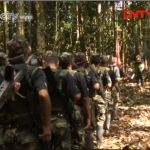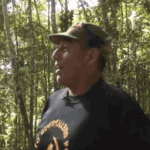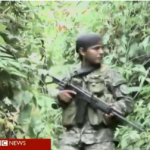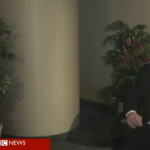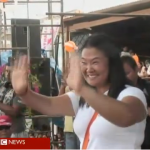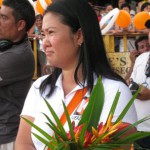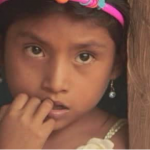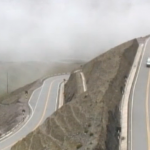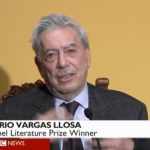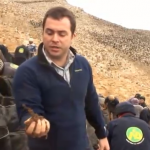Dan Collyns reports for CCTV’s Americas Now program about the last rebel leader for the Shining Path, Artemio.
Read MoreOn the eastern slopes of the Andes the fast-flowing brown waters of the Huallaga river descend into the Amazon rainforest. Here the high altitude and warm climate of the broad valley create ideal conditions for growing coca, the leaf used to make cocaine. In the 1980s and 90s Colombian drug barons colluded with the Peruvian armed forces to cultivate and export tonnes of coca from the region.
Florindo Eleuterio Flores-Hala, known by the nom de guerre of Artemio, controlled the Upper Huallaga valley. To Peruvians he is a folk legend: loathed and respected in equal measure. As the commander of the Huallaga faction of the brutal communist guerrilla movement the Shining Path, he had a bloodthirsty reputation and a long reach.
He is now the only member of the Maoist-inspired faction’s central committee who is still alive and at large. The movement’s supreme leader, Abimael Guzman, known as “Presidente Gonzalo” to his fanatical followers, was caught in 1992, starting the group’s rapid decline. He is serving a life sentence, as is his partner, Elena Iparaguirre.
Following the death last month of the leader of Colombia’s Farc guerrillas, Alfonso Cano, Artemio can lay claim to being the last of a generation of Latin American guerrilla leaders. He is also one of the US’s most-wanted men – the state department’s Narcotics Rewards Programme offers a $5m reward for information leading to his arrest or conviction. As a result, Artemio is not an easy man to get hold of – he last spoke to the international media in 2004. Now, for the first time, he has agreed to let his face be shown.
Following a path through the Huallaga coca plantations, the Guardian was greeted by a teenager with an automatic rifle, a black Shining Path T-shirt and a black bandana bearing the yellow letters “Ejercito Guerrillero Popular” (The People’s Guerrilla Army). He led to a forest clearing where 34 young men, armed and in army fatigues, stood to attention.
An older man wearing the same uniform but carrying a slight paunch greeted us warmly and introduced himself as Artemio. He beckoned us into the shade to rest and drink a cup of hot cocoa. After some small talk he opened a bottle of sickly sweet Peruvian red wine, telling us how much he had been looking forward to our arrival.
At dusk we hiked up to a plateau where the trees had been cleared from the middle, with black tarpaulins neatly lined up on one side. Plantains stewed in a blackened pot on a log fire. Jungle cumbia music played on the radio as we were served rice pudding and more hot chocolate.
It was a preamble to an unusual press conference. Artemio wanted a truce and a general amnesty for both sides, he told us. After 30 years of armed struggle he would be prepared to sit down with the government of the Peruvian president, Ollanta Humala, and negotiate a unilateral ceasefire. “We just want to do political work, we’d keep a small force for our defence and we would not attack as long as we’re not attacked.
“The reality of today is that we need to change our ways,” he said. “The armed struggle is over.”
Artemio has made previous peace overtures, but each time it has ended in renewed attacks on the armed forces and civilians. He said he had been offered a fair trial if he surrendered, but the sticking point is his demand for the release of the Shining Path’s supreme leader, Guzman – an impossible prospect to any Peruvian government to consider. For orthodox members of the Shining Path, Guzman is the fourth sword of communism after Marx, Lenin and Mao. According to Guzman’s philosophy, blood was necessary to irrigate the revolution.
A 2003 truth and reconciliation commission estimated 69,280 Peruvians were killed between 1980 and 2000. It concluded the Shining Path was the main perpetrator.
At 5.30am the next day the teenage guerrillas lined up to sing The Internationale, which warbled from Artemio’s portable radio. The rebel leader was in good spirits. He hummed along as a USB memory stick plugged into his radio played Elvira Madigan, Mozart, Andrew Lloyd Webber and – a particular favourite – Richard Clayderman’s Ballade pour Adeline. As the troops hoisted red banners and the hammer and sickle flag, it was hard to reconcile the man with a penchant for romantic music with a reputation for being a monster.
For Artemio there was to be no contradiction. He could justify almost every action by his communist conviction of class struggle. “I deeply regret the loss of life of soldiers – youngsters like me who were simply following orders – but they were defending the interests of the capitalists and the bourgeoise classes. Still it hurts me,” he said. Artemio, too had begun his adult life as a soldier, serving two years of military service. “I’m a Peruvian patriot,” he said. “I was born as a man in the army. Now I’m in another army on the side of the people.”
Born in 1961 to landless peasants in Peru’s southern Arequipa province, Jose Pepe Flores, as he was known to his friends and family, sang on the streets to support his brothers and sisters.
“I know poverty, I know it from my childhood and when I came to know Peru, when I left my neighbourhood and went to Lima and other places, I understood that it wasn’t just me and my circumstances but practically all of Peru. I began to read the book of Mao Zedong quotes; I must have read it a thousand times.”
In the early 1980s his convictions led him to Guzman and the Shining Path. He became one of its most powerful military leaders in its most economically important territory – the Upper Huallaga. The area’s lucrative cocaine trade made it the killing fields of Peru’s drugs war long after the 1980-2000 civil conflict was over. In the last decade bloody corpses have been marked as soplones, or informants, in towns such as Aucuyacu, Peru’s equivalent to Ciudad Juárez, the Mexican city torn apart by feuding drug cartels. How can he justify that?
“What else can you do with a soplón,” he replied. “There is no other option with informants but to kill them.”
The Shining Path had a code of “selective annihilation” – meaning on occasion civilians could be killed to achieve its goals, he explained. In one case a whole family was murdered, including a nine-months-pregnant woman. That had been an error, he admitted.
“Put yourself in my shoes,” he said. “I have to eliminate them or they will eliminate me.”
While his operational capacity has sharply declined in recent years as, one by one, his lieutenants have been captured or killed in raids by Peruvian special forces, Artemio has always stayed one step ahead, relying on local intelligence and a small army of peasant farmers’ sons.
“The young are always ready to fight because they believe in change,” he said.
Despite the high socialist ideals, Artemio has survived using his guile. He denies government charges that he controls drug-trafficking and charges protection money to businesses and illegal loggers – all the evidence suggests that is how he has stayed at large for almost two decades.
“He has managed to survive and keep on fighting and in the process he has become a master of bushcraft, of guerrilla warfare and of sheer survival,” said Gustavo Gorriti, a journalist and author on the Shining Path who also met Artemio during this one-off encounter.
“He uses the combination of favour, flattery and fear – the fear he provokes in people through the knowledge of his ruthlessness.”
Now this old warrior says he wants to lay down his arms and enter the political arena on behalf of the banned Peruvian Communist party. Whether this hope is the product of desperation or a romantic delusion, it is hard to tell.
He has cheated death so many times, surviving four bullet wounds in 1986 and countless army raids on his jungle camps, but perhaps he thought his luck would soon run out. He seemed to accept it could all end at any moment.
As we marched towards our departure point, Artemio turned up the volume on his radio. Beethoven’s Fifth reverberated through the forest. Perhaps he still imagined himself as a soldier for social justice.
Read MorePeru’s cocaine producers are becoming increasingly efficient and the country’s coca leaf coverage is practically on a par with Colombia’s.
Anti-drug police carry out raids on the jungle drugs laboratories in an effort to disrupt production of the ‘white gold’.
The BBC’s Dan Collyns accompanied them on a mission to destroy the drug producing equipment.
Read MoreThe left wing president-elect of Peru, Ollanta Humala, has told reporters that he views the United States as a strategic partner.
Mr Humala said he would cooperate with the US and other Latin American countries to combat drug trafficking, poverty and corruption.
His announcements followed a bitter election campaign.
Read MorePeru’s presidential election is too close to call as voters prepare to head to the polls on Sunday.
Should she win, Keiko Fujimori, would be the country’s first woman president.
But as the daughter of the former President Alberto Fujimori, who is serving a 25-year stretch for corruption and links to death squads, many see her as a controversial figure.
Read MoreAsk a Lima taxi driver how he will vote in the Peruvian elections this Sunday and he might, with a world-weary sigh, characterise the dilemma as choosing between your wallet and your conscience.
Thinking of your wallet means voting for Keiko Fujimori, daughter of the former President Alberto Fujimori who is serving a 25-year stretch for corruption and links to death squads.
She promises to maintain Peru’s market-friendly model, which has made it one of the world’s fastest growing economies, but critics say she could repeat the sins of the father.
Keiko Fujimori’s last name, for many Peruvians, is synonymous with the destruction of democratic institutions, systemic corruption and a murderous counter-insurgency against Maoist Shining Path guerrillas in the 1990s.
Read the full story on the BBC
Read MoreUp to twenty children in Peru have died from rabies after being bitten by vampire bats.
So now health workers are now vaccinating the most vulnerable in the remote Amazonas province of Condorcanqui, close to the border with Ecuador.
Families live in huts with hardly any walls and often not enough mosquito nets for everyone. The destruction of the rain forest appears to have led to a drop in the number of natural predators of the bats, helping them to thrive.
Now villagers are fighting back, collecting bats from caves so that scientists can sequence the DNA of the rabies virus to create a genetic map that may eventually help to reduce outbreaks.
Read MoreA new road linking the east and west coasts of South America is being opened.
The road runs through Brazil and Peru and some like Luis Aguirre, Governor of Peru’s Madre de Dios region, are warning of the damage the new road will cause.
But supporters, like cafe owner Suleyde Ochoa, say it will bring huge economic benefits to both countries.
Read MoreThe winner of this year’s Nobel Prize for Literature, Mario Vargas Llosa, has arrived in his native Peru after receiving his award in the Swedish capital, Stockholm.
The 74-year-old author is the first Peruvian to win a Nobel prize. He faces a packed agenda of awards, ceremonies and celebrations in Peru.
Read MoreGuanape Sur island off northern Peru makes money from selling bird droppings – also known as guano. Commonly used in the 19th Century as a fertiliser, this organic product is making a comeback.
Two types of sea bird whose droppings produce guano – the Peruvian Booby and Guanay Cormorant – are protected. About 300 men live and work on the island for eight months of the year.
The guano is shipped off to organic farmers in Peru’s mountains and jungle. Peru is the world’s number one guano producer, with 30,000 tonnes a year.
Read More